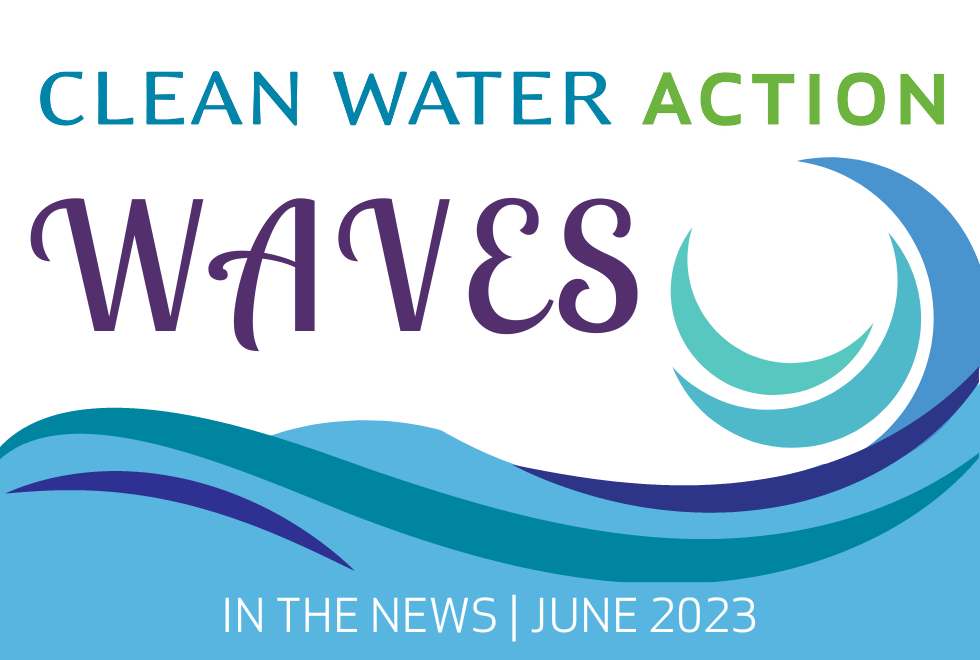
Our work to protect clean water across the country often makes the news. Clean Water Waves highlights recent articles featuring our staff speaking on their areas of activism and expertise.
National
Starbucks’ iconic coffee cup has a climate problem as mobile, drive-thru orders boom
Kaitlin Balasaygun | CNBC | June 3rd, 2023
“Smaller cafes are looking to these larger corporations to set the precedent for how their coffee shops should operate,” said Grace Lee, director of Clean Water Action’s ReThink Disposable program.
Learn More About ReThink Disposable
National
How can I avoid eating food with ‘forever’ chemicals?
Teddy Amenabar | The Washington Post | June 7th, 2023
“Forever chemicals,” or PFAS, which stands for per- and polyfluoroalkyl substances, are known for their persistent ability to remain in nature – and the body for years. Certain PFAS have been associated with serious health effects, including infertility, high blood pressure and some cancers, according to the Food and Drug Administration.
Cindy Luppi, the national field director for Clean Water Action, said “it’s very hard” for people to avoid products with PFAS.
Experts recommend storing leftovers and other food in glass containers, not plastic, in the fridge.
“Move away from plastics wherever possible,” Luppi said. “That’ll be one relatively easy and cost-effective thing to do.”
New Jersey
Belgium-based Solvay to pay $393M to clean up and compensate for PFAS contamination in New Jersey
Wayne Parry | The Associated Press | June 28th, 2023
“Forcing Solvay to pay up and clean up is long overdue,” added Amy Goldsmith, state director of Clean Water Action. “Polluters like Solvay should have the book and more thrown at them for what they have done.”
Massachusetts
Lawmakers hope to ‘turn off tap’ of PFAS forever chemicals in Mass.
Colin A Young | MassLive | June 22nd, 2023
Filed by Rep. Kate Hogan of Stow and Sen. Julian Cyr of Truro, the bill (H 2197 / S 1356) would ban the use of PFAS in most products to prevent new contamination, require sellers to inform customers if PFAS chemicals are present in their products, create new programs to clean up contamination that already exists, and would have the state regulate PFAS chemicals as one class rather than individually.
“As long as we keep making and using things with PFAS, we will keep contaminating our bodies and the environment with ever-increasing amounts of PFAS. The only solution is to turn off the tap,” Laura Spark, senior policy advocate at Clean Water Action, told the committee.
Pennsylvania
Secretive State Climate Talks Stir Discontent With Pennsylvania Governor
Kiley Bense | Inside Climate News | June 18th, 2023
Steve Hvozdovich, the Pennsylvania campaigns director for the environmental group Clean Water Action, said he was encouraged that Shapiro was “trying to bring in various stakeholders” for the climate working group who could “develop a strong and cohesive policy” on climate change for the state.
He also expressed support for other environmental priorities identified by the governor, like aiding Pennsylvanians affected by the train derailment in East Palestine, Ohio and a project to plug abandoned leaking wells across the state. The governor “has done a fairly good job up to this point in time, especially considering that he’s had to deal with a state House that’s been in flux,” he said, referring to the turmoil of special elections, party infighting and deadlock in the Pennsylvania House of Representatives this session.
Hvozdovich said that the governor’s decision to obscure the details of the climate working group’s goals has had the unintended effect of calling attention to what it could be hiding rather than on what it could accomplish.
“We would like to see a little bit more transparency there,” he said. “I understand, in some ways, not wanting to have the process influenced. But it’s tough to know how encouraging the fruits of that committee’s labor is when you don’t know who makes up the committee, let alone what they’re actually discussing beyond the Regional Greenhouse Gas Initiative.”
In Our Own Words
Rhode Island | Opinion | R.I. must stop PFAS pollution before these ‘forever’ chemicals contaminate waterways, and us
From Rhode Island State Director Jed Thorp: "If we don’t want toxic PFAS in our water, then we have to stop putting it in our water. There is no proven technology available that can effectively remove these harmful chemicals from wastewater, so Rhode Island needs an upstream solution to this problem if our state is going to meet the standards for PFAS set just last year. Luckily, we have one."
Read the full article in The Boston Globe


